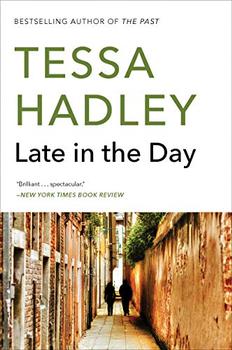Summary | Excerpt | Reviews | Beyond the Book | Read-Alikes | Genres & Themes | Author Bio

This article relates to Late in the Day
 Many writers, artists, and other creatives experience the occasional block – an inability to create or a sudden lack of ideas for moving forward with their work. Both Alex and Christine deal with this issue in Tessa Hadley's Late in the Day, and for Alex the block spans many years. The term creative block was coined in 1947 by Dr. Edmund Bergler, an Austrian psychiatrist and disciple of Sigmund Freud. He described the condition as a person's "unconscious wish to defeat one's conscious aims, and to enjoy that self-constructed defeat." There is something to this definition, but not every creative block is the result of inadvertent self-sabotage.
Many writers, artists, and other creatives experience the occasional block – an inability to create or a sudden lack of ideas for moving forward with their work. Both Alex and Christine deal with this issue in Tessa Hadley's Late in the Day, and for Alex the block spans many years. The term creative block was coined in 1947 by Dr. Edmund Bergler, an Austrian psychiatrist and disciple of Sigmund Freud. He described the condition as a person's "unconscious wish to defeat one's conscious aims, and to enjoy that self-constructed defeat." There is something to this definition, but not every creative block is the result of inadvertent self-sabotage.
These blocks are almost always psychological in nature, and perhaps the most common cause is insecurity or self-doubt. A person may feel that their work is not good enough, that it will be rejected or even ridiculed by others. Self-criticism can be paralyzing. Individuals who suffer from anxiety or depression may find overcoming a block even more difficult; depression has been shown to reduce psychomotor activity, resulting in the formation of fewer ideas. Stress from major life events like the death of a loved one can also inhibit creative function, which is what happens to Christine in the novel. Alex's issues seem to be tied to his relationship with his father, and this is a common situation as well; creativity can be hindered by unaddressed trauma from childhood. Since meaningful art and writing often require a great deal of emotional honesty, those unwilling or unable to get in touch with their emotions will often find themselves incapable of producing.
There is no certain "cure" for a creative block, as in some cases the underlying cause must be fixed before a person can move forward. Meditation and mindfulness practices are recommended by many, and if the cause is potentially emotional or related to trauma, cognitive-behavioral or art therapy may provide a solution. If the problem seems to be something simpler, like a lack of new ideas, mental health professionals recommend simple practices like changing your normal working routine or environment, brainstorming and stream-of-consciousness writing, and even, when necessary, giving yourself permission to simply take a break.
 Many famous artists and writers have suffered from this condition, including Impressionist painter Claude Monet, who stopped working for two years after the death of his wife Alice in 1911, and Franz Kafka, who once complained in his journal, "How time flies; another ten days and I have achieved nothing. It doesn't come off. A page now and then is successful, but I can't keep it up, the next day I am powerless." Author Hilary Mantel reasserts the necessity of taking breaks, advising, "If you get stuck, get away from your desk. Take a walk, take a bath, go to sleep, make a pie, draw, listen to music, meditate, exercise; whatever you do, don't just stick there scowling at the problem." Take her advice – she's written 15 books.
Many famous artists and writers have suffered from this condition, including Impressionist painter Claude Monet, who stopped working for two years after the death of his wife Alice in 1911, and Franz Kafka, who once complained in his journal, "How time flies; another ten days and I have achieved nothing. It doesn't come off. A page now and then is successful, but I can't keep it up, the next day I am powerless." Author Hilary Mantel reasserts the necessity of taking breaks, advising, "If you get stuck, get away from your desk. Take a walk, take a bath, go to sleep, make a pie, draw, listen to music, meditate, exercise; whatever you do, don't just stick there scowling at the problem." Take her advice – she's written 15 books.
Writer's Block image, courtesy of bang2write
The Rose Arches was one of the first paintings Claude Monet was able to complete after his wife died.
Filed under Cultural Curiosities
![]() This article relates to Late in the Day.
It first ran in the January 23, 2019
issue of BookBrowse Recommends.
This article relates to Late in the Day.
It first ran in the January 23, 2019
issue of BookBrowse Recommends.
Your guide toexceptional books
BookBrowse seeks out and recommends the best in contemporary fiction and nonfiction—books that not only engage and entertain but also deepen our understanding of ourselves and the world around us.